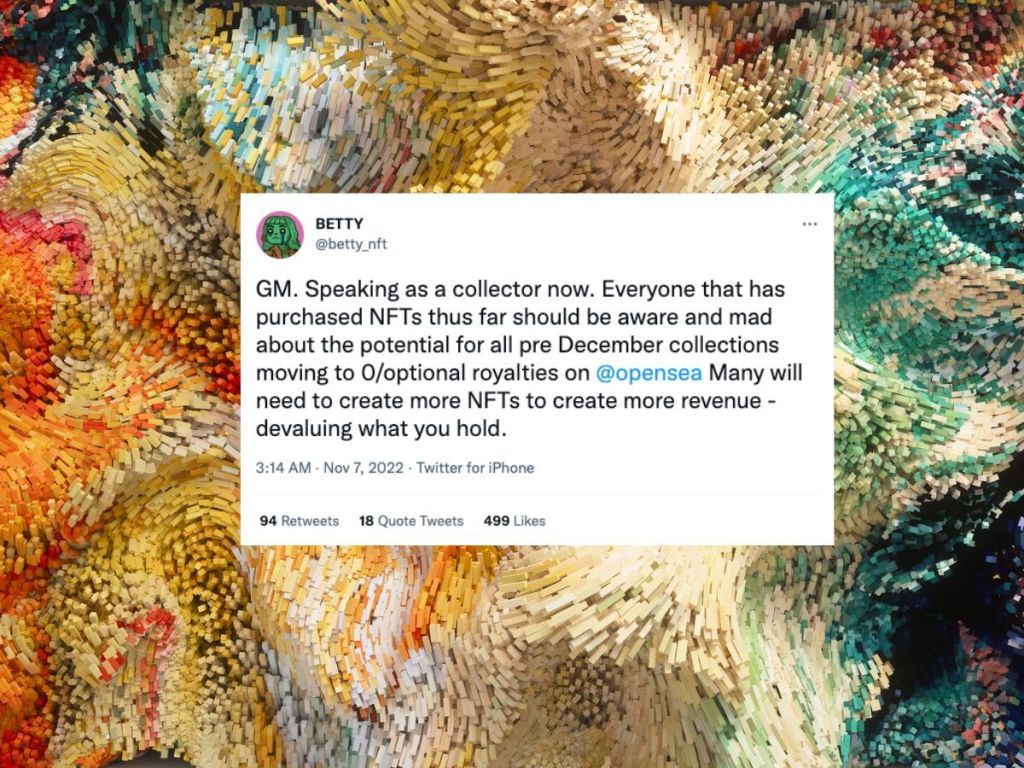The past few weeks haven’t been great for NFT creators, with many major platforms in the NFT space such as Solana’s Magic Eden and Ethereum-based LooksRare moving to drop royalty enforcements for future Web3 artists.
Now, the world’s largest NFT marketplace OpenSea, which currently accrues US$300 million per month in trading volume, is looking to follow tentatively in their footsteps. In a recent Twitter thread, the platform outlined what it called a “principled, thoughtful approach” which will see the creators of new NFT projects blacklist certain marketplaces that don’t allow royalties as of November 8.
Saying that the decision to enforce fees on-chain (royalties) wasn’t a “marketplace’s to make”, OpenSea’s new tool will see creators set their own fees, but only if they elect to use the new toolkit.
OpenSea royalties debate
The platform added that it’s still mulling over what to do with pre-existing NFT projects and will continue to keep its lines of communication open until December 8, where it will officially roll out the new system. Following December 8, the marketplace will have to make a critical decision as to whether it continues enforcing royalties or treads the path of almost all the other major platforms.
A recent Twitter thread published by pseudonymous user Punk9059, collected data from Ethereum NFT marketplace X2Y2 to show that when traders are given the option of paying additional royalties, it’s really not surprising to find that many just don’t pay them. As of October 29, only 18% of all NFT traders on X2Y2 are paying royalties.
With OpenSea remaining purposefully unclear about the future of royalties on its platform, many major creators in the Web3 space are extremely concerned about the “race to the bottom” approach that has become increasingly common throughout the NFT ecosystem.
Creators lose out
“In a market where volume is down OpenSea have shown us precisely where their priorities lie — and it’s not with the creators,” prominent Web3 artist Joan Westenberg told The Chainsaw.
“It’s with their decidedly Web2 investors, not the permissionless creator economy that Web3 espouses,” Westenberg added.
“OpenSea is attempting to lure traders at the cost of creators; the move will leave pre-December creators without access to royalties, and post-December creators without any trust or stability,” she wrote.
For Joan, the announcement from OpenSea was a classic case of a platform attempting to “have its cake and eat it too”.
“They want to appeal to creators and the ecosystem via lip service while squeezing every possible cent out of the market in pursuit of their own version of zero royalties,” she declared.
While the platform’s current stance hasn’t definitively removed royalties altogether, NFT creators have good reason to be sceptical about what the future holds for royalty payments on OpenSea.
Midway through last month, Solana NFT marketplace Magic Eden announced that it would always support creator royalties on its platform, and yet just a few days later, completely backflipped on the decision once it realised that royalty-free marketplaces were beginning to eat away at their market share.
Betty isn’t having a bar of it
Deadfellaz Founder Betty penned an extensive and damning criticism of OpenSea’s move saying that OpenSea will “disproportionately fuck over emerging artists and marginalized creators who will need to turn to VC funding. Statistically, over 95% of VC funding goes to men.”
Betty added that a recent conversation with the leadership at OpenSea had done very little to reassure her of the platform’s intentions with royalty payments moving forward. “After speaking with OpenSea it feels like there is no plan and no clear answers were given in regards to existing collections & artist’s royalties.”
“Communication has been misleading and facts are not there. Speak up if you feel a certain way about this because it has impact,” she wrote.
Sappy Seals founder wab.eth weighs in
In correspondence with The Chainsaw, pseudonymous founder of the Sappy Seals NFT project Wab.eth weighed in saying that while OpenSea’s move isn’t necessarily bad for the NFT space altogether, but that it was ultimately “anti-competition”.
“They’re squeezing out their competition and still taking their cut without giving anything from their end,” Wab wrote.
Australian NFT creators take the stand
Jackson Meij, the founder of Australian NFT project Beefy Blokes echoed a similar line of thinking. “It’s good and bad,” Meij told The Chainsaw.
“It’s good because it forces people to actually create something meaningful and it means that people won’t have to rely on royalty payments,” he said.
“But it’s still bad because I think it was great for true artists & other solo ventures. Which I think is the sacrifice. Although there are better marketplaces for pure artwork,” Meij added.
Morgan Stone, the founder of Roo Troop pointed out an issue with marketplaces like OpenSea removing royalties in the long-term. Stone alluded to a future where the aggressive race-to-the-bottom style removal of royalties would ultimately see creators launch their own marketplaces.
Speaking to the impact of zero royalties on his project, Roo Troop, Stone said: “While no royalties won’t have that big of an impact on Roo Troop because we have multiple revenue streams, I think it’s unethical for marketplaces to forcefully remove what we set forth as requirements on our collections.”
“The only good thing about zero royalties is that it’s sparked the debate of building revenue streams for businesses and it’s highlighted how many idiots are running projects while depending on royalties as their main source of income,” Stone added.
“Abandoning royalties throws entire mission of Web3 off”
Ultimately, OpenSea’s tentative approach to enforcing royalties has the NFT community in an uproar, with many figures in the space labelling the move as antithetical to the core ethos of Web3.
“Philosophically, abandoning creator royalties throws the entire mission of Web3/NFTs off”, tweeted major NFT artist Bobby Hundreds in an explainer thread. “As the biggest mainstream NFT marketplace, if OpenSea subtracts creator royalties, it will significantly impact the entire ecosystem.”





